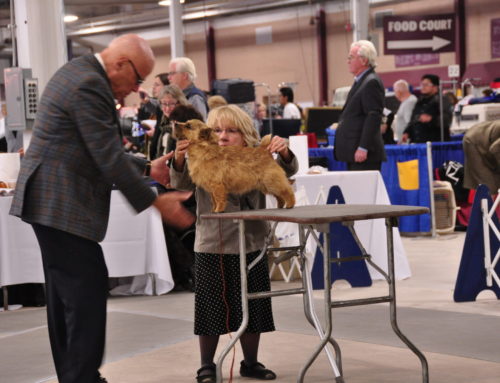In the nearly two decades that I’ve owned Norwich Terriers, I haven’t vaccinated them for leptospirosis. Frankly, until the recent survey by our breed’s parent club, I haven’t given it much thought one way or the other, but it may be time to update my position.
Leptospirosis is an infectious bacterial disease worldwide in humans and in dogs. Because breeders and owners of Norwich Terriers have been cautious about the lepto vaccine, after recent outbreaks of leptospirosis were reported, the Norwich Terrier Club of America decided to gather information about the individual practices and experiences of our members. We surveyed our membership and asked questions about vaccine administration; adverse events; the clinical management and outcomes of any dogs diagnosed with lepto disease; and exposure of their dogs to known risk factors for leptospirosis, such as excessive rainfall, living near a watershed, dogs using shared facilities, and swimming or hunting.
Nearly half of our Club members responded (168 complete questionnaires were returned). 68% of respondents were breeders, and 40% had been in the breed more than 20 years. They owned an average of 4 Norwich Terriers (range 1-15). 40% had “ever given” the lepto vaccine. Only a few reported recommending the lepto vaccine to their puppy buyers and, in fact, 65% discouraged it. Our members tended to favor a breeder’s advice over a veterinarian’s advice regarding whether to give the lepto vaccine to a Norwich Terrier or not. I found this result especially thought-provoking. My first puppy came with a health and vaccine record that said in bold red caps: “No time in the life of Norwich Terrier should the leptospirosis vaccine be given. This breed is extremely sensitive to this vaccine!” This fear of the lepto vaccine was common then, and probably related to anaphylactoid reactions which is a possible risk in most vaccines, especially for small breeds. In our Club’s survey, 14 members reported an adverse reaction to the vaccine with varying symptoms indicated.
Decisions about lepto and other noncore vaccination protocols require weighing the risk of an adverse vaccine reaction against the risk of the individual dog becoming ill or even dying from the disease in question. In our survey, 9 cases of lepto infection were reported in Norwich Terriers; 8 of these dogs recovered without lasting chronic effect, and 1 died. The prognosis for dogs, without respiratory complications, who are treated early and aggressively is usually good. Treatment typically includes antimicrobial drugs and IV fluids, and sometimes hemodialysis to enable renal function to recover. Our members reported a number of known risk factors, however, only water (living near or dogs drinking from open water) appeared to influence their decisions to administer the lepto vaccine.
The survey result that less than half of our members had ever administered the lepto vaccine may relate to how people in general tend to weigh risks. We are more likely to avoid risks stemming from an action than from inaction, even if inaction is more dangerous. This “omission bias” occurs because people tend to feel a greater sense of responsibility for their actions than for their inactions. Another internal force that shapes our thinking is the tendency to remain true to our original choice or decision. So the owner who opted not to vaccinate may hold fast to that decision even when presented with opposing scientific evidence. Trust is also one of the most important influences on our decisions. The credentials of the person or organization providing the information often tips us one way or the other.
Owners frequently ask veterinarians about what vaccines their dogs should get, but present-day answers may be different from 15 years ago. According to the American Veterinary Medical Association’s Council on Biologic and Therapeutic Agents, “medical decisions concerning vaccine selection and administration protocols are among the most complicated medical decisions facing veterinarians today.” Veterinary medicine’s understanding of the immune system continues to evolve, and the susceptibilities of various local and regional populations to diseases change.
In recent years, the emotional and oft-politicized vaccine debate (in children and pets) has fueled a largely unjustified backlash against vaccinations in general. I have followed a minimalist approach to non-core (optional) vaccines, adopting the belief that vaccines have contributed to the recent uptick in autoimmune disorders and other chronic disease. Vaccines have played a significant role in protecting dogs and humans from dangerous, transmissible (and sometimes fatal) diseases. But, every available vaccine is not necessarily indicated for every dog. The decision to administer non-core vaccines should be based on the individual dog’s potential for disease exposure, and the risks and benefits associated with vaccinating. As we make decisions about non-core vaccinations for our dogs, we should consider the official vaccination recommendations developed by interdisciplinary advisory committees, and be receptive to new and emerging knowledge about vaccine safety.
The complete results of the Norwich Terrier Club of America Health Committee’s survey are available here: www.norwichterrierclub.org/ntca-member-lepto-survey
Jane R. Schubart, AKC Gazette Breed Columnist ascot.js@gmail.com; The Norwich Terrier Club of
America website: www.norwichterrierclub.org (717) 635-8464





